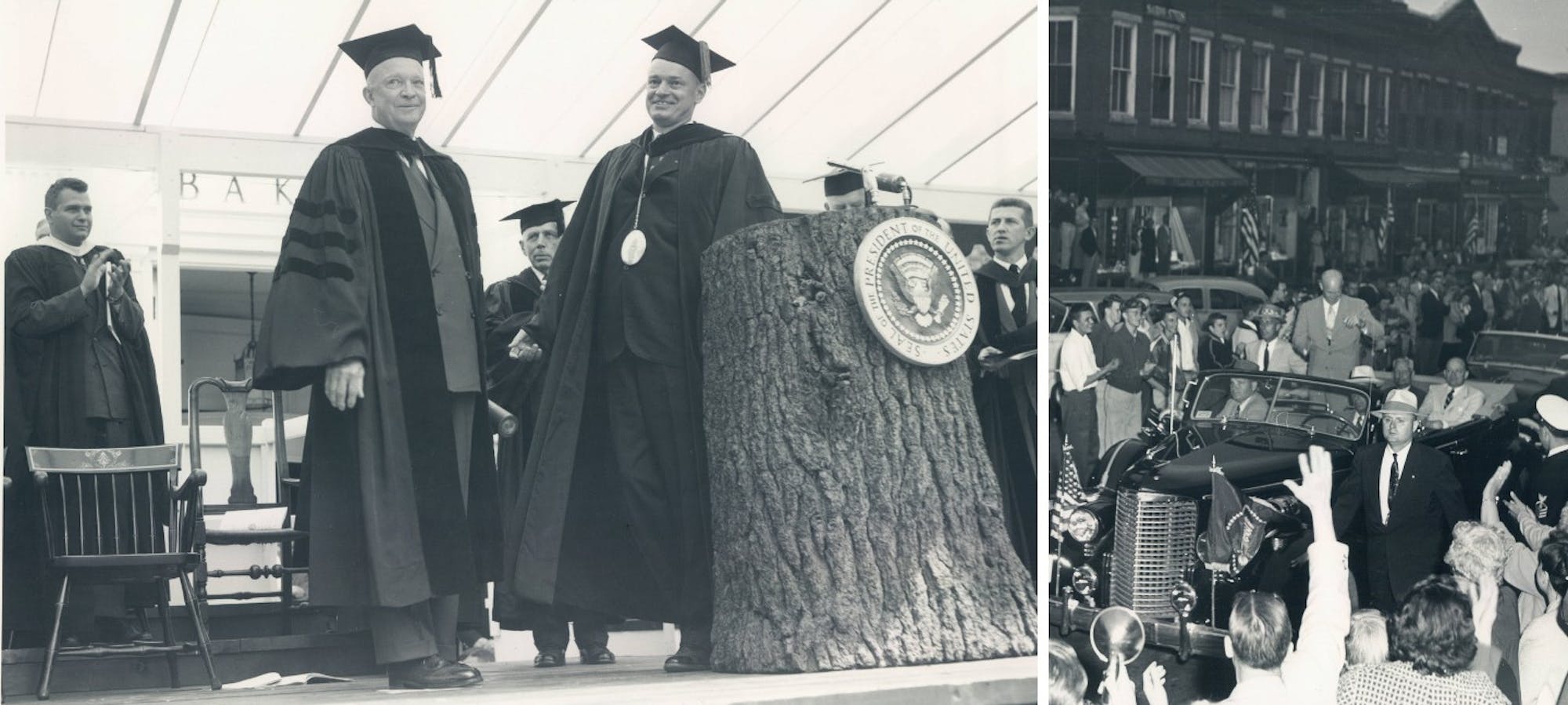On September 11, the Class of 1953 and the Rockefeller Center for Public Policy co-hosted historian William Hitchcock to commemorate former U.S. President Dwight Eisenhower’s 1953 Commencement address.
The event, titled “Don’t Join the Book Burners: Eisenhower at Dartmouth, 1953” took place over Zoom. According to director of the Rockefeller Center Jason Barabas ’93, approximately 75 people attended virtually, while an additional 40 members of the Class of 1953 and their families — celebrating their 70th reunion — viewed the event in a conference room at the Hanover Inn. Hitchcock, a history professor at the University of Virginia and author of “The Age of Eisenhower: America and the World in the 1950s,” had originally planned to speak in-person, but shifted his presentation online after contracting COVID-19.
Barabas said that the idea for the event originated as a joint celebration of Eisenhower’s address and the 40th anniversary of the Rockefeller Center, which the College celebrates this month. Nelson Rockefeller, the center’s namesake, served as secretary of Health, Education and Welfare during the Eisenhower administration. Barabas added the event was a “good opportunity” to reflect on American history of the recent past.
“We are still dealing with many of the issues that the country was dealing with then,” he said.
The event began with Hitchcock setting the historical background and political landscape of the United States in 1953 — emphasizing the specter of McCarthyism — before discussing Eisenhower’s commencement address at Dartmouth. According to Hitchcock, Eisenhower settled on two themes for his speech: fun and courage. Those two themes have been the essence of his presidential legacy, Hitchcock added.
“When he talked about fun, I don’t think he was being frivolous, but what he was saying was not to forget the joy of sharing the American experience,” Hitchcock said. “I do think the two terms — fun and courage, which were the keynotes of his speech — are in some respects characteristic of Eisenhower.”
During his lecture, Hitchcock also analyzed the political context of Eisenhower’s address. The most memorable line from Eisenhower’s address, “Don’t join the book burners,” made national headlines because many interpreted it as a clear swipe against former Sen. Joseph McCarthy, R-Wis., Hitchcock said.
“[Eisenhower] wanted to convey this important message: Don’t join the cynics, the anti-intellectuals, the fear mongers — instead be open-minded,” Hitchcock said. “[Eisenhower’s speech] rightly stands as a brief encapsulation of Eisenhower’s core values: to have the courage to engage with the world, not to fear it.”
Hitchcock explained the significance of the term “book burn,” which was a figurative description in the 1950s used to describe a campaign by McCarthy to remove books authored by people with supposed Communist ties from public spaces. Eisenhower, who served as Supreme Commander of the Allied Expeditionary Force during the Second World War, saw parallels between McCarthyism and the Axis Powers, he added.
“It’s no wonder that Eisenhower would have been appalled,” Hitchcock said. “He knew all about the real book burners.”
According to Hitchcock, Eisenhower did not go much further in rebuking McCarthy than in his Dartmouth address until 1954, when the president took a substantial position against McCarthy; the Senate launched an investigation and voted to censure McCarthy that same year.
“You have to understand the options as [Eisenhower] saw them,” Hitchcock said. “Eisenhower had a sense of patriotism that transcended his political identity.”
Richard Cahn ’53, a managing editor of The Dartmouth at the time of Eisenhower’s commencement address, said he believes about 10,000 people were lined up to see the President when he arrived in Hanover.
Cahn said he hoped Hitchcock would return in person to deliver another speech about Eisenhower.
“It was fun to go back and reminisce about that moment,” Cahn said. “[Hitchcock] was absolutely right on the mark. He painted Eisenhower not as a perfect figure, but as someone who had the highest standards and who had an uplifting outlook.”
Ross McIntyre ’53, who watched the event with his family, said Hitchcock’s presentation was “wonderful.”
“There is no topic more important now than freedom of expression,” McIntyre said. “Freedom and tolerance are things we need to continuously pay attention to.”




